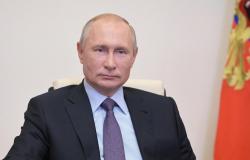Exactly one year ago, on March 29, 2023, the American journalist Evan Gershkovich was arrested by the Russian secret services in a restaurant in Yekaterinburg, in central-western Russia, on charges of espionage. He was there to work on an article on the Wagner Group’s operations for the Wall Street Journalan American newspaper for which he had been a correspondent for six years, reporting among other things on the war in Ukraine.
Gershkovich has been in prison in Moscow since then, awaiting a trial whose date has not yet been set: so far only hearings have been held, all behind closed doors, which have served to prolong his detention. The last one was held on March 22, when a court in the Russian capital extended his detention for the fifth time, until June 30, 2024. Both Wall Street Journal Numerous journalists and observers have consistently called the espionage allegations false and specious, and so far Russian security forces have shown no evidence to suggest that Gershkovich was a spy. Gershkovich faces up to 20 years in prison.
Over the last year the Wall Street Journal systematically dealt with the conditions of its journalist: the publisher, Dow Jones Company, said it was willing to pay a bail of 50 million rubles (501 thousand euros) in exchange for his release, a request however refused by a Russian judge. On the occasion of the first anniversary of his detention, the Wall Street Journal decided to leave a large blank space on the first page of the paper edition, with the headline: “There should have been an article by him here.”
Gershkovich’s case caused controversy from the beginning because it was the first time that an American journalist had been arrested in Russia since the Cold War: the last arrest, dating back to 1986, was that of Nicholas Daniloff, correspondent for US News & World Report, released two weeks later as part of a prisoner exchange. The hypothesis that Russia wants to use Gershkovich in a prisoner exchange with the United States is not excluded, and indeed is considered probable. The Russian authorities themselves confirmed this, but said that it could only happen once the trial is over.
The arrest of journalists in Russia is nothing new, especially when those involved are journalists working for the few independent media outlets left in the country. Usually the accusations are of having disobeyed the police or of carrying out “extremist activities” due to an alleged proximity to the Anti-Corruption Foundation founded by the dissident Alexei Navalny and banned by the authorities in 2021. However, it is rather rare for foreign journalists to be arrested. The US government considers Gershkovich “unjustly detained”, a de facto term used to refer to political prisoners.
Gershkovich is 33 years old. He was born in 1991 in New York to Jewish parents from the Soviet Union, a country from which they had fled about ten years earlier to escape the regime’s persecution. Gershkovich developed a particular interest in Russian culture from a young age, and after an initial period in New York he began to deal specifically with Russia when he was hired at Moscow Times, an independent Russian newspaper in English. He then worked briefly for the news agency Agence France-Presse (AFP) before being hired by Wall Street Journal to deal with Russia.
Before his arrest, Gershkovich had dealt with many different topics, some of which were overlooked by much of the international press: he had written for example about the disappearance of salmon from the Amur, a very long river on the border between Russia and China, and about the demonstrations against the extinction of minority languages in some areas of Russia.
For months he has been detained in Lefortovo prison, in Moscow: a prison built in 1881 which since 1917, the year of the Bolshevik revolution, has acquired a more “political” function. The Soviet secret police of Joseph Stalin’s regime used it to lock up, interrogate, torture and often kill opponents of the regime. After Stalin’s death in 1953, Lefortovo prison was used first by the KGB, the Soviet secret service, which locked up dissidents and espionage suspects, and then by the regime of Russian President Vladimir Putin.
«Once a week he meets his Russian lawyers and periodically goes to court», says the Wall Street Journal. «Friends and family send him letters to update him on the world and what’s happening at work. He plays chess via mail with his father and gives suggestions for the totobasketball championship in which he was participating. He devours the Russian language classics and history books from the prison library.”
Last October the Russian authorities also arrested Alsu Krmasheva, a Russian-American journalist who worked for the broadcaster Radio Free Europe/Radio Liberty, financed by the American government. Kurmasheva lived in Prague, Czech Republic, but she had temporarily entered Russia on May 20 to visit her ailing mother. Lei Krmasheva was initially fined for failing to declare that she also had a US passport, in addition to her Russian one, when she entered the country. Unable to leave without documents, she remained in Russia, and on 18 October she was arrested on charges of not registering as a “foreign agent”, a term which under Russian law indicates people or organizations which, according to the government, receive funds from the abroad to carry out anti-government activities, and which is in fact used to repress freedom of the press and more. She is still in prison awaiting trial.





